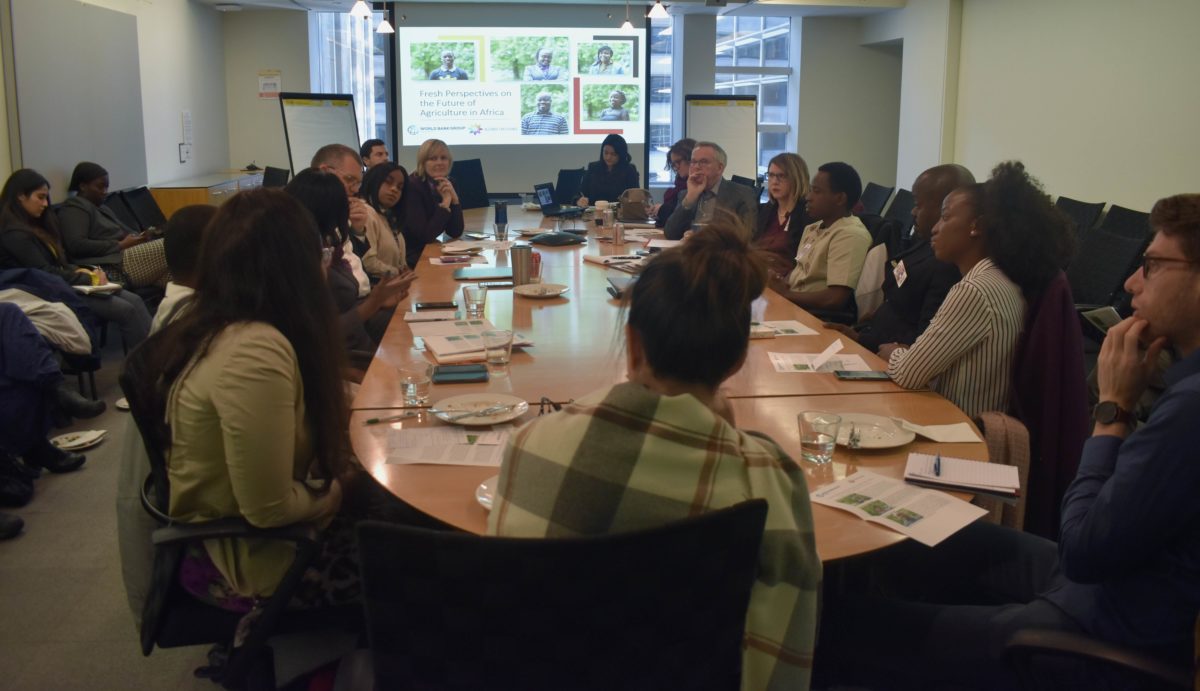Cornell Alliance for Science Global Leadership Fellows have called on the World Bank to increase funding for science research as a sure way to address poverty and under development in Africa.
They are also urging the bank to prioritize and increase investments in dealing with emerging challenges in agriculture, such as novel pests and climate change.
The Fellows, who represented Kenya, Zimbabwe and Rwanda, issued their call during a meeting with Holger A. Kray, practice manager in agriculture and food security, and other officials at the World Bank headquarters in Washington, D.C.
The World Bank is one of the most powerful financial institutions, giving billions of dollars in loans and grants to developing countries to run capital projects aimed at reducing poverty, with improving agriculture a key component of the bank’s work over the years.

African countries have been key beneficiaries of various World Bank initiatives and they continue to see increased investments. In 2018, the bank announced it would increase its existing commitments of about $10 billion — aimed at better integrating the continent to accelerate development and offer job opportunities — by another $6 billion over the next three years.
But there have been concerns that many of the bank’s projects have taken top-down approaches, instead of ideas emanating directly from local people. After completing their recent 12-week training in science communication and advocacy, a select group of African Fellows visited the World Bank to suggest some issues worthy of priority funding.
Increase funding for science
“Climate change is dealing a blow to food production systems,” said Zimbabwean scientist Nyasha Mudukuti. “And this is where we come in as plant breeders. We have the technologies and we want the World Bank and those who have the money to invest in us for the benefit of farmers.”
“It’s a win-win situation,” she added. “When the science is funded, people have access to the technology. They make profit. They can benefit out of it. My ask is, I hope the World Bank can invest in science.”
Prioritize emerging challenges
Dr. Murenga Mwimali, a plant breeder and coordinator of the Water Efficient Maize for Africa (WEMA) project in Kenya, urged bank officials to pay more attention to emerging challenges facing African agriculture like the rampaging fall armyworm and climate change.
An increased focus on these issues by powerful institutions like the World Bank is needed to stimulate fresh innovations that can help bring these challenges under control, he noted.
“These emerging challenges require new thinking to resolve, including scientific innovations like genome-based technologies, gene editing, etc. Science matters, and the time to act is now,” he said.
Help farmers get affordable financing
Pacifique Nshimiyimana, who is an agribusiness entrepreneur from Rwanda, observed that despite recent successes, farming in Africa remains a risky investment. He noted that farmers are vulnerable due to limited access to technology that could make production resilient to droughts, disease and pests.
He challenged the World Bank to work towards making low-cost financing available to smallholder farmers “so we can afford needed technologies, including genetic engineering and gene editing, to mitigate the risks associated with farming.”
Invest in science communication
Kenyan journalist Rose Mukonyo drew attention to the need for a greater focus on science communication so emerging agricultural technologies that can change the lives of farmers are not misconstrued.
“Africa is an agricultural economy, but current global economic crises like rising food prices and the threat of climate change have reinforced the urgency to find lasting solutions through the use of science,” Mukonyo said. “Journalists need to accurately spread the message about technological advances being developed to mitigate these challenges. Journalists need to be trained in effective science communication, so their stories make communities better instead of retarding development.”
Prioritize the interests of women
Ruramiso Mashumba, who chairs the Zimbabwean Farmers Union’s youth wing, called on the World Bank to prioritize the interests of women. She reminded bank officials that the majority of food growers in Africa are women, adding that the sure way to help feed the growing population is to empower female producers.
“How can we work with you to get necessary funds to invest in technology transfer to farmers in a way that do not exclude the voices of women farmers?” she asked.
Mashumba observed that unlike their male counterparts, women farmers face unique challenges, including the inability to own land and difficulty in acquiring property to use for collateral to get loans for agricultural production.
“How can you support those who are marginalized in agriculture? The youth… the women. Because they really need support,” she said. “It’s only African women who can really feed the world.”
World Bank officials indicated their readiness to work with the Fellows to help make their suggestions realities. They indicated efforts are already ongoing on such issues as women empowerment and financing opportunities for farmers through the bank’s country and regional offices in Africa.
